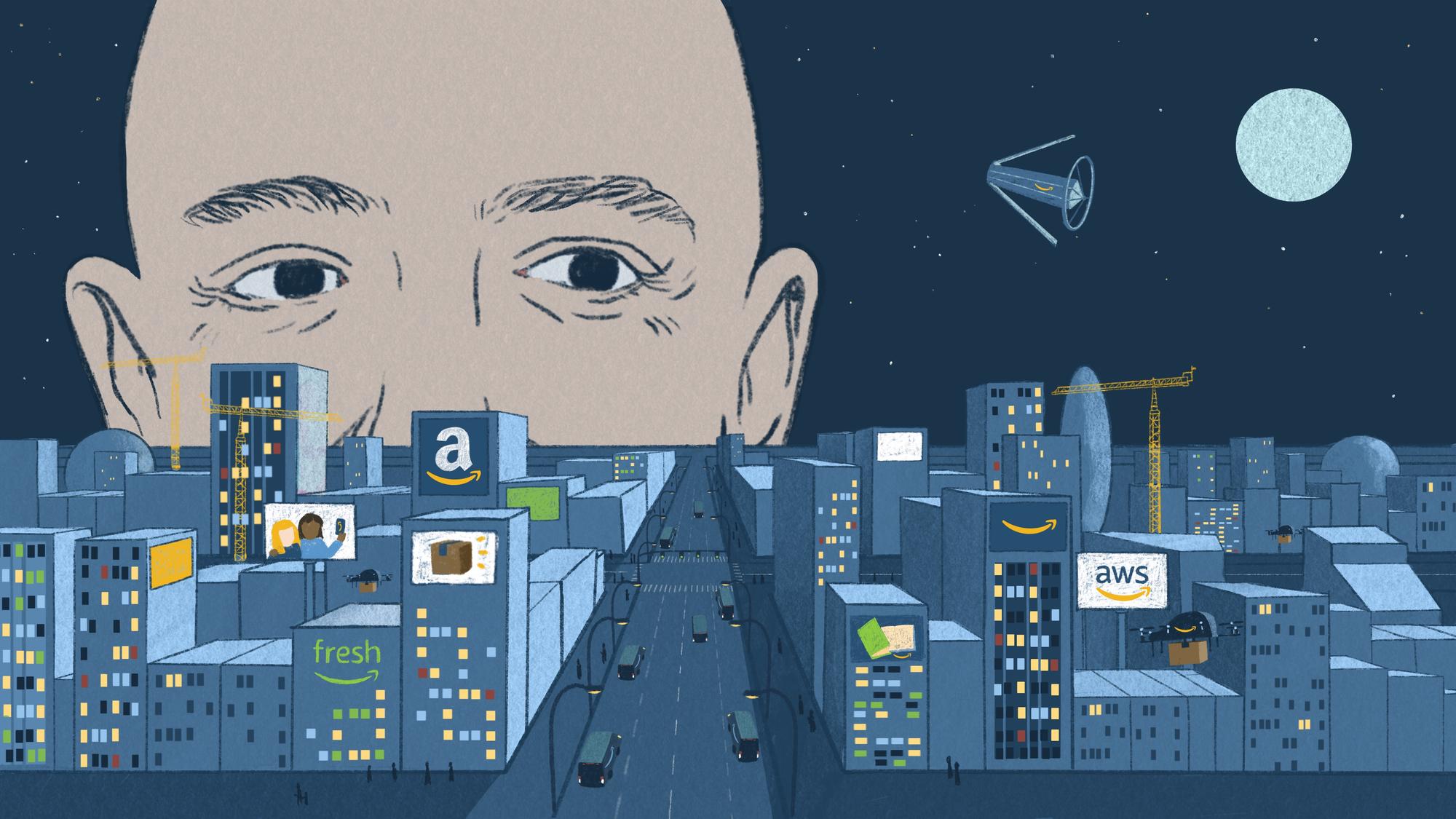Naturally, the Seattle-based leviathan begs to differ. Vertical integration is an unalloyed good, I can hear the company’s lawyers explaining. Amazon’s entry into industry after industry generates efficiencies, innovation, convenience and countless benefits for the customer. Moreover, they argue, Amazon is far from a monopoly. There is and will continue to be healthy, intense competition in all the markets Amazon plays in.
Of course, Amazon is obliged to say all that. The antitrust enforcers are breathing down its neck. But does the company truly believe it? More to the point, does the man whose vision and personality constitute Amazon’s DNA truly believe it?
No doubt Jeff Bezos enthusiastically agrees with the first part, about the benefits of Amazon’s sprawling, multi-industry model. But I’m less sure that he harbors modest feelings about his empire’s trajectory toward market dominance, or cares all that much about competition in the normal capitalist sense. It’s hard to look at the story of Amazon’s rise and not see world-shaping ambition, the kind that remains dissatisfied while any terrain, down to the smallest hamlet, lies unconquered. Is Bezos’s real desire to make Amazon not merely the “everything store” or an “everything company,” but … everything?
I don’t know. Maybe Bezos himself doesn’t know. But let’s suppose that this is indeed Amazon’s endgame. The year is 2120, and the grand vision has been realized. Did Seattle feel like a company town way back in 2017? Imagine a company country, a company world — a company universe, in fact, because we now live in spinning space cylinders, built by Amazon, hovering between the Earth and moon. We all work for Amazon, too, developing software, mining asteroids, producing and moving goods, teaching in Bezos Academy schools. We shop on Amazon for products made by Amazon, we buy food at Amazon Fresh and Amazon Go, and we entertain ourselves with “content” — movies, music, podcasts, books — created for Amazon.
You might think this future sounds dystopian. But I think it’s worth asking: Would it really be so bad?
Amazonland: Innovation or stagnation?

Antitrust is grounded in beliefs about the virtues of competitive markets in a capitalist economy. The Federal Trade Commission website sums it up: “Aggressive competition among sellers in an open marketplace gives consumers — both individuals and businesses — the benefits of lower prices, higher quality products and services, more choices, and greater innovation.”
Amazon, in our story, is a benevolent master, so its principled obsession with the customer survives the climb to world domination. In other words, the company doesn’t start hiking prices or peddling shoddy wares just because all competition has shriveled away. But can this single, massive corporate entity generate variety and innovation anywhere near as well as an open marketplace? Or will creativity in this brave new world shrivel away, too, and technology and invention inevitably stagnate? It’s a complicated question.
Innovation is deeply ingrained in the self-image of the entire tech sector, and Amazon is no exception. But critics have poked plenty of holes in this portrait. For one thing, the Amazon edifice was not molded entirely from undifferentiated clay; it was also assembled from building blocks ready-made. To put it less charitably, Amazon exploits the innovations of other businesses. It copies the products of successful third-party sellers in its Marketplace, “strip mines” open source software, buys out competitors and enters new markets by acquiring existing companies.
On top of that, as the economist Mariana Mazzucato argued in her influential 2013 book The Entrepreneurial State, the whole notion of the private sector as the primary fount of innovation is highly suspect. Silicon Valley might get all the credit, but in fact, publicly funded research produced many of the inventions we associate with Big Tech, from the internet and search engine algorithms to touch screens and GPS.
And if that weren’t enough, the chances are slim that any one corporation can remain agile and creative indefinitely. In the 1970s, researchers Michael Hannan and John Freeman concluded that businesses, in general, do not adapt; they are replaced. Several studies in the early 2000s found that high-performing companies rarely remain near the top of their industry for more than a decade, and the handful of major companies that have endured for a very long time do not tend to be high performers. Innovation, in this telling, occurs through an evolutionary process of selection and, as times change, newer players tend to win out. Old dogs seldom learn new tricks.
So far, it’s not looking great for Amazonland. But let’s not jump to conclusions. The state’s key role in innovation doesn’t exactly argue for the indispensability of competitive markets; on the contrary, it suggests that a single large entity, with sufficient resources and guided by the right values, can take us far. In our imagined, rose-tinted future, surely Amazon could assume that role. Moreover, Amazon’s quarter-century track record already marks it as an outlier, in some way different from the great mass of companies whose stars rise and as quickly fall. Maybe Amazon has figured something out. Could it be that Amazon has succeeded in building a model that avoids the pitfalls of large bureaucracies and keeps the fountain of innovation gushing forth?
Descriptions of Amazon’s internal structure and culture, including Brad Stone’s in his 2013 book, The Everything Store: Jeff Bezos and the Age of Amazon, suggest we shouldn’t write off this notion. Far from being a passive cog in a faceless machine, Amazon employees — the well-compensated white collar and tech workers, that is — work in small groups and are given wide latitude to propose and pursue ideas. They’re encouraged to question and criticize. Progress, it is understood, requires making mistakes and exploring what turn out to be dead ends. Amazon tries things out — and it sure has the resources to try things out. If those things work, it runs with them. If not, they’re abandoned. In other words, to some extent, Amazon has embedded within itself the process of generating new business ideas and sifting the wheat from the chaff that normally occurs in the churn of the open market.
In our imagined future, this process would expand. Consider the life of today’s third-party seller. You’ve created this fantastic product, but to find customers you have to sell on Amazon, which squeezes you at every turn. The more success you find, the more you’re waiting for the day Amazon starts offering a copycat version of your product. But your 2120 counterpart? She simply works for Amazon, inventing, designing or producing new items for the Marketplace. The ones that prove popular get produced on a wider scale. Her existence still feels creative, even entrepreneurial, just without the desperate hustle to turn a profit. Sure, sometimes her projects fail, but when they do, that doesn’t mean her small business crumbles and everyone who works there is cast out, unemployed. Which life would you choose?
I’m sure there’s plenty not to like about working for Amazon, too, and maybe 17 reasons are jostling around in your head right now, shouting about why this is all a horrible idea. But on this point I think we’ve established reasonable doubt: Amazonland is not destined to decay because the demise of interbusiness competition will unavoidably stifle innovation.
Amazon’s ‘God’s-eye view’

But there’s a more fundamental sense in which Amazon’s rise undermines conventional wisdom about market competition. Ever since Adam Smith’s invisible hand, economists have marveled at the magic of capitalist markets — how the actions of countless individuals and businesses, each concerned with little beyond their immediate environs, their own needs and wants and opportunities, can nonetheless combine to produce a system of vast order and complexity, generating untold wealth and an abundance of novel and useful goods. You don’t have to believe it works perfectly to be amazed that it works at all.
In the early 1940s, with World War II raging and the Cold War on the horizon, the Austrian-born economist Friedrich Hayek was busy articulating this magic for a new age. He juxtaposed the freedom of the market to what he considered the inevitable despotism of centrally planned economies. But the choice wasn’t only about liberty, it was about what it took to run a complex, modern society. Markets, Hayek argued, process an enormous amount of information in a decentralized manner, effectively and efficiently. No bureaucracy is up to the task.
How much truer must this be today, when people and products have multiplied and capitalism has gone truly global? How could a single entity, be it a government or corporation, ever keep track of what to produce, and how much, and where it’s wanted, and by whom? As Hayek argued, "dispersed knowledge is essentially dispersed, and cannot possibly be gathered together and conveyed to an authority charged with the task of deliberately creating order."
Enter Amazon.
As Franklin Foer points out in his illuminating essay on the mind and motives of Jeff Bezos, Amazon “has acquired the God’s-eye view of the economy that Hayek never imagined any single entity could hope to achieve.” Within the growing slice of commerce it oversees, Amazon knows where everyone lives, what they consider buying and what they buy, at what price, how often and how much. Not only that, Amazon is fast building the infrastructure to store and ship all those goods quickly and efficiently, matching supply and demand at a grand scale. There are no bread lines in Amazonland; bread, if you desire it, appears every morning, freshly baked, at your doorstep. Or, as Foer concludes, with some hyperbole: “[If] Marxist revolutionaries ever seized power in the United States, they could nationalize Amazon and call it a day.”
If Amazonland is Bezos’s dream, what’s ours?

Where does this thought experiment leave us, and what does it mean for antitrust? Amazonland invites us to think about whether the things capitalist markets are supposed to be uniquely good at — spurring innovation and mediating the efficient allocation of goods and services — could be accomplished as well by other means. Of course, even if we’re convinced by this argument, I’m not suggesting we hand Jeff Bezos the keys to the city, let alone the universe; this imagined future can still be distasteful or terrifying, even if invention thrives and toilet paper is always delivered within the hour.
Nor does it immediately follow that we should reject the ambitious antitrust goal of breaking apart Amazon. From a progressive-left perspective, there are reasons to bust up corporate leviathans that go beyond the FTC’s paean to aggressive competition. Antitrust advocates are also motivated to spread economic power and ownership more broadly, creating opportunities for entrepreneurship and upward mobility. They want workers to have more bargaining power, which is arguably enhanced when there are more and smaller employers to choose from. They want to reduce economic inequality and financial instability — both of which have been deepened, according to a recent study from two Federal Reserve Board economists, by a four-decade slide toward monopoly. They want to diminish the political clout of capital and save democracy.
However, all this points to a larger challenge when thinking about antitrust, boiling down to a question of vision: Amazonland might be Amazon’s endgame. But what’s ours?
Are we essentially aiming to recreate the prosperous decades that followed World War II, but on a higher plane? In that scenario, we revive aggressive antitrust enforcement, reregulate the private sector, reweave the safety net, rebuild unions and reinvigorate local economies. But this time, several generations older and wiser, possessed of better science and greater self-understanding, we’ll do it all better. We’ll also correct the grave shortcomings of that earlier era, finally overcoming racial oppression, abolishing poverty and protecting the natural systems that sustain us. And this time, we won’t let our progress be reversed. If that’s the plan, then sure, let’s break up Amazon.
Or are we trying to transcend capitalism altogether? If so, how does breaking up Amazon figure into that trajectory? Should we instead — just maybe — let Amazon continue taking over our economy, and then, like Foer’s revolutionaries, take over Amazon? Antitrust has always been, in part, about saving capitalism from itself. But do we want to save capitalism from itself? And can it be done, or is it a fool’s errand?
It’s not the first time these alternatives have been juxtaposed. During the 1912 presidential election, socialist candidate Eugene Debs dismissed the call to break up the great trusts — and not only because antitrust law, weaponized against his striking union, once landed him in jail. He argued that competition, once a constructive force, was now merely destructive. To seek a return to the smaller-scale capitalism of the past was to fight against the tide of history and progress. Instead, workers must organize and ultimately “socialize” the trusts, operating whole industries for the common good instead of for profit.
If Debs had a point about the destructive side of capitalist competition in 1912, the case today is far stronger. The voracious drive for profit, playing out on an ever wider scale, is rapidly disrupting ecosystems and the global climate in irreversible, catastrophic ways. If growth is endogenous to capitalist markets, what does that mean for our finite planet? The transactional, individualistic ethos of the market has seeped ever more thoroughly into social life, too, eroding other ways of being and leaving people isolated and insecure — and desperate, if they have the means, to buy their way out of the void. It’s hard to appreciate the allocative genius of the market while homeless people huddle in tents in the shadows of glittering towers, a full century and a half after the start of our first Gilded Age.
Is it possible to harness and tame this beast? Should we want to?
In practice, when it comes to thinking about antitrust and what to do about Amazon, how one answers these questions probably matters less than I’ve been suggesting. After all, the idea of cheering on Amazon’s project of world domination, if that’s what it is, and then “socializing” the company as Debs hoped would happen to the trusts, is more of a conceptual exercise than an actual plan. No one, progressive or socialist, is getting anywhere fast without building broad movements to take on corporate power, organize workers and strengthen democracy. In this project, those who are ready to throw capitalism onto the ash heap of history would do best to join forces with those who would settle for a bevy of kinder, gentler, smaller Amazons.
Still, Amazonland is worth a visit, if only in imagination. Maybe it sounds absurd to look for clues to a post-capitalist future in the workings of the greatest capitalist enterprise in human history. With its incessant drive to expand, absorbing and transforming everything in its path, Amazon appears less like a flesh-and-blood corporation than an avatar of capitalism itself. But that’s kind of the point. If Amazon, with its vast resources, talented workforce and technical prowess, has figured out how to simulate within itself some of the more beneficial processes and functions of competitive markets, it invites us to think about how similar processes and functions might be embedded in a wholly different kind of society. Jeff Bezos is dreaming big; so should we.
(Disclosure: The organization the author works for, the Transit Riders Union, is a member of a coalition that opposes Amazon on many issues, including antitrust.)
This is the final piece in a six-part series on Amazon and antitrust. Read the other installments:
1. A new era of trustbusting could begin with Amazon, tech giants
2. Capitalism, competition, and why antitrust is so confusing
3. 1912: When antitrust views collided in a presidential election



